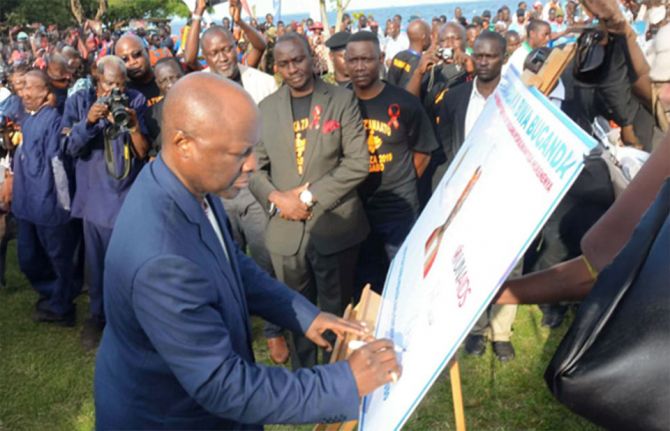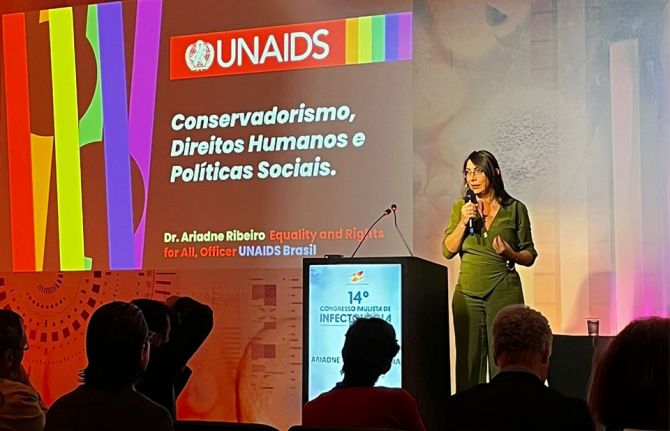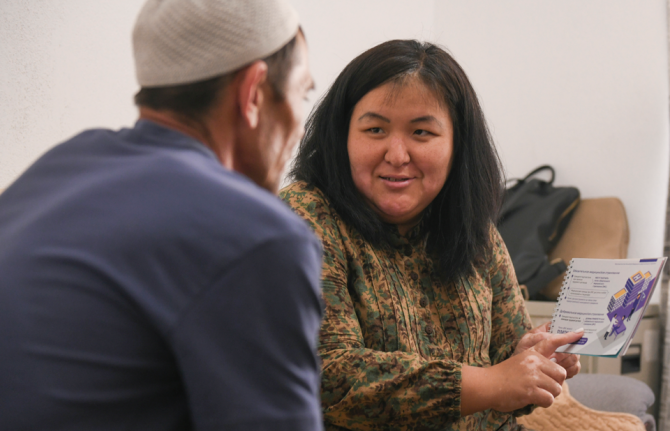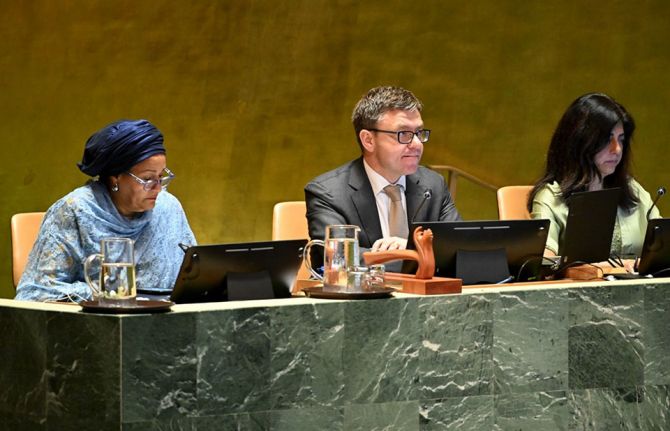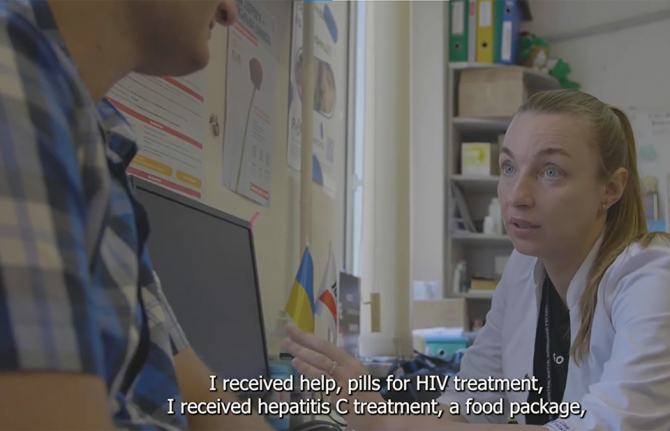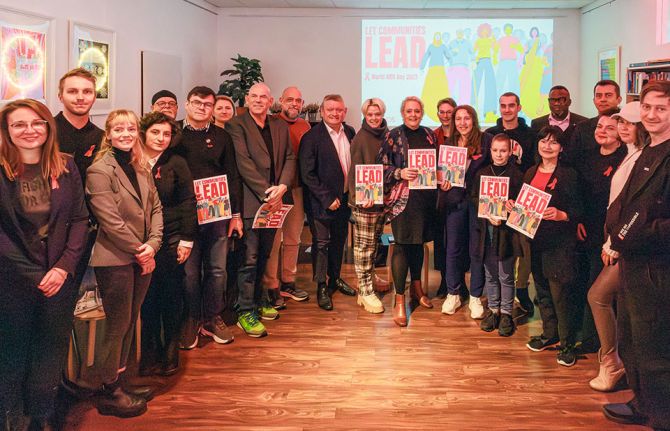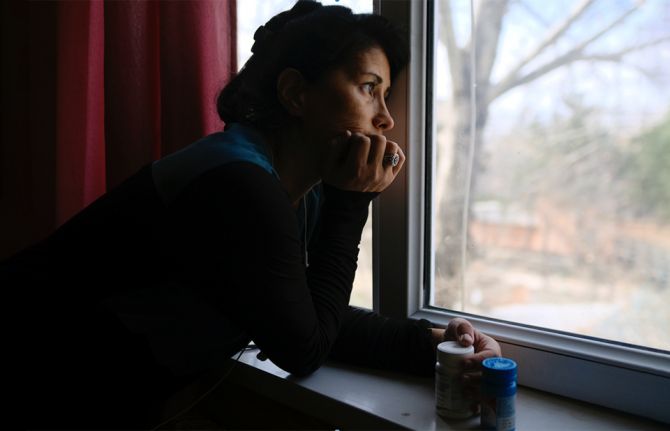
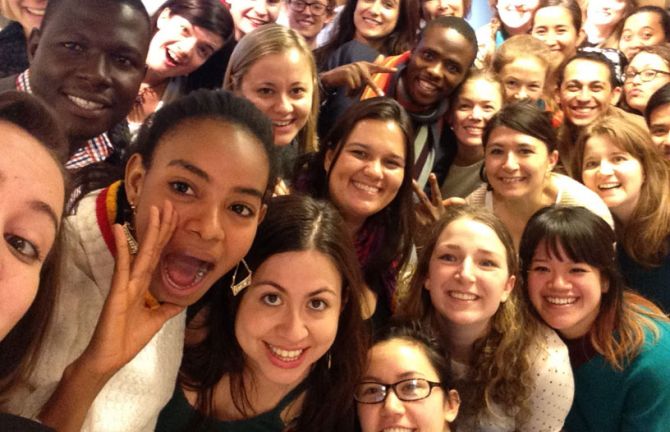
Debrief
Post-2015: a global movement for HIV and sexual and reproductive health and rights
30 January 2015
30 January 2015 30 January 2015In the lead up to the post-2015 development agenda, young people have been consistently calling on the international community to recognize their sexual and reproductive health and rights (SRHR) through global, regional and national consultations.
To rally a global movement to influence national positions and political will and to inspire action towards achieving the SRHR goal, UNAIDS, in collaboration with Restless Development, the International Women’s Health Coalition, the PACT for social transformation and the Norwegian Agency for Development Cooperation (Norad), convened a meeting in Oslo, Norway, from 27 to 29 January.
Participants
The event brought together some 40 organizations working on women’s rights, SRHR, lesbian, gay, bisexual, transgender, and intersex issues, and youth and HIV. UNAIDS Goodwill Ambassador, Her Royal Highness Crown Princess Mette-Marit of Norway, and the Director of Norad, Villa Kulild, also participated in the event.
Key messages
- The participants discussed the current situation regarding the post-2015 development agenda and the efforts needed to mobilize and reach youth constituencies in the final phase of intergovernmental negotiations.
- The participants shared lessons learned on high-level coalition building and opportunities to advance the youth SRHR and HIV agendas for the year ahead.
- The participants agreed to form a coalition to advance the social, economic and political determinants of health, strengthen language on SRHR, and address the lack of comprehensive sexuality education and access to health services for young people.
- The coalition will lobby for the inclusion of indicators on these topics in the accountability framework of the post-2015 development agenda.
- The coalition will advance this agenda both through advocacy in New York as well as through connecting and supporting a pool of young advocates calling for change at the country level.
- The coalition also defined the means of collaboration between the different organizations as well as their contributions to the global campaign.
- The global campaign will run from February to September 2015, with several days of action taking place at strategic moments in the lead up to the 70th session of the United Nations General Assembly.
Quotes
“The adoption of the post-2015 framework is a historic opportunity to advance the issues young people have been calling throughout the process. It is time for leaders commit, invest and deliver the education and services that will fulfill every adolescents right to sexual and reproductive health.”
“Collaboration with young people is essential to ensure that sexual and reproductive health and rights programmes and policies address their realities, concerns and priorities. We must recognize young people’s diverse needs and experiences and uphold their rights to health, bodily autonomy and participation at every level.”
“We need to rethink comprehensive sexuality education to make sure it addresses the sexual and reproductive health needs of young people living with HIV.”
“Meetings like these always start with big dreams but amazingly in three days we managed to set out a concrete strategy moving forward. We are excited and energized to take on the current gaps in the post-2015 agenda.”
“Ending the AIDS epidemic cannot be achieved without sexual and reproductive health and rights. We have to make the connection between sexual rights and women’s rights, safety and health-care access and access to quality HIV treatment, and to reaching marginalized populations, including young women, with services in the post-2015 era.”
Region/country
Related
 “Who will protect our young people?”
“Who will protect our young people?”

02 June 2025

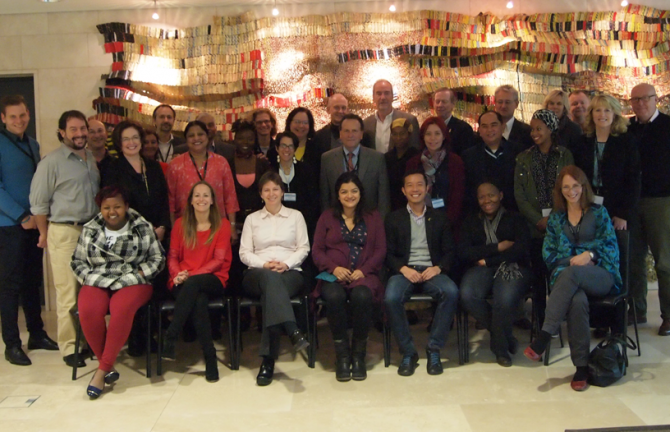
Debrief
Reviewing the role of condoms in the fourth decade of HIV
10 November 2014
10 November 2014 10 November 2014Condoms have had a transformative impact on the trajectory of HIV epidemics worldwide and today are an established, well-known and widely used prevention method. Recent findings show that condom use among young people is high and stable in many rich countries but much lower in low-income countries. Yet, global advocacy and social mobilization for condoms has become less prominent in recent years, with donor investments for male and female condoms and lubricants no longer increasing.
To keep up the momentum and accelerate condom promotion and distribution as part of efforts to reduce sexual transmission of HIV by 90% by 2020, UNAIDS, UNFPA, USAID/Office of the Global AIDS Coordinator and the Bill & Melinda Gates Foundation co-convened a meeting from 6 to 7 November in Geneva, Switzerland, to identify opportunities for condom and lubricant programming in the fourth decade of the HIV epidemic.
Participants
The meeting brought together experts from civil society organizations, government and the United Nations system.
Key messages
- In 2013, about 1.9 million new adult HIV infections occurred, the vast majority of which were due to sexual transmission of HIV.
- Condoms remain a cornerstone of effective prevention and are a core basic programme activity under the UNAIDS Investment Framework approach.
- In 2012, the donor community supplied 3 billion male and 32 million female condoms. In sub-Saharan Africa, this translates into eight condoms per man per year and one condom per every 10 women per year.
- Condom stock-outs remain a critical challenge to HIV prevention. Innovative ways to alert and overcome stock-outs are urgently needed.
- Thirty years into the response, policy barriers still limit access to condoms and lubricants for key populations, particularly sex workers, men who have sex with men and young people.
- Condoms are still often associated with promiscuity. In several countries, carrying condoms is commonly used as evidence of being a sex worker and is associated with harassment, abuse and arrest.
- Condoms are an essential part of any HIV programme and should routinely be made available in all sexual and reproductive health efforts.
- The female condom has been long neglected, but it has a critical role to play in HIV prevention as the only proven effective method designed to be used by women. It must be globally brought to scale.
Quotes
“Let us not undo our own achievements! Condom and lubricant programmes are critical to reach our HIV prevention targets by 2020. There is a new generation of young and sexually active people—they too will need condoms to protect themselves from HIV. We will not end AIDS without scaling up effective HIV prevention”
“South Africa is one of the leading pioneers of condom programming worldwide. Male and female condoms are a cornerstone of our prevention efforts—without them, we will not be able to change the trajectory of our HIV epidemic.”
“HIV prevention messages have to be strengthened to operate on a personal level to reach gay men and other men who have sex with men, especially the youngest. Condom and lubricant programming has to take into account pleasure, sexual satisfaction, relationship status and comfort with different levels of risk.”
“It is important to transcend the association of condoms with disease and rather position them as being something fun, necessary and trendy. Young people do not want to think of health but rather having a great sex life. Condoms needs to be where young people make their sexual health decisions. I am looking forward to seeing them in nightclubs, pubs, stadiums and cool student hangouts”.


Debrief
Success with PrEP: next steps to support policy decisions in southern and eastern Africa
29 October 2014
29 October 2014 29 October 2014Oral pre-exposure HIV prophylaxis (PrEP) has been shown to be up to 90% effective in preventing HIV infection among people who take it consistently. However, the United States of America is the only country in which PrEP is licensed and recommended for use within HIV prevention programmes.
In order to find ways to bridge the gaps between evidence and policy-making processes, UNAIDS, AVAC and WHO organized a meeting during the 2014 HIV Research for Prevention (HIV R4P) conference, which is taking place from 28 to 31 October in Cape Town, South Africa. HIV R4P is the world’s first scientific meeting dedicated exclusively to biomedical HIV prevention research.
Participants
The meeting brought together representatives of ministries of health and national AIDS councils from Kenya, Mozambique, South Africa, Uganda and Zimbabwe, PrEP researchers and participants from research and demonstration sites where PrEP is currently being delivered, funders and drug manufacturers, and HIV activists.
Key messages
- PrEP is being used in several demonstration projects across eastern and southern Africa, covering a wide range of populations, including serodiscordant couples in Kenya and Uganda, sex workers in Zimbabwe and men who have sex with men in Kenya and South Africa.
- In order to be used more widely, PrEP must be part of a comprehensive prevention strategy with associated milestones and success indicators that have been defined with policy-makers. The Kenyan Prevention Roadmap already includes the possibility of PrEP.
- Costs and cost-effectiveness models remain key, as are the selection of populations for which PrEP should be offered and the choice of an appropriate delivery model. The Sisters clinics, which provide a dedicated service for sex workers in Zimbabwe, are acceptable to many sex workers and fit within a government strategy.
- The early stopping of the PROUD PrEP study demonstrates that within the sexual health services of the United Kingdom of Great Britain and Northern Ireland there is a strong demand for PrEP and that it is feasible to identify people at greatest risk.
- Demand is now beginning to grow in African communities and needs to be stimulated among those who would most benefit and would be most likely to use PrEP.
- Policy-makers in health and other government departments need more information on PrEP presented in a way that they can use, as well as opportunities to discuss their specific concerns, for example on PrEP safety studies or measures to improve adherence.
- More needs to be understood about the costing of PrEP. This demands greater understanding of who would use PrEP, how they would use it and where they would access it.
Quotes
“As a woman living with HIV, how I wish that we had known about PrEP then. We knew how to judge our risk and we knew that our risks of getting HIV were high; we would have taken PrEP.”
“The opportunity costs of scaling up PrEP provision are high but can bring wider benefits beyond HIV infections and lifelong treatment averted. We need a coherent strategy, to be sure that the investment pays off.”
“The voluntary medical male circumcision experience can inform the advancement of PrEP.”
Related information
Related

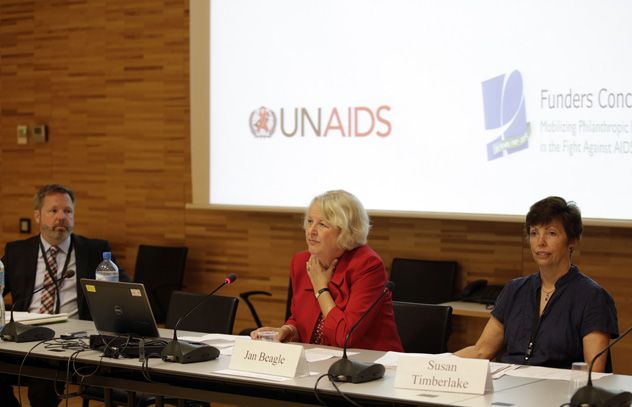
L to R: John Barnes, Executive Director, Funders Concerned about AIDS; UNAIDS Deputy Executive Director Jan Beagle; and Susan Timberlake, Chief, Human Rights Division at UNAIDS.
Debrief
Donors and partners commit to sustaining HIV and human rights programming as a stepping stone to ending the AIDS epidemic
17 June 2014
17 June 2014 17 June 2014Funding for HIV-related human rights work by civil society is insufficient and may be threatened even further. Research from UNAIDS, with the support of the Ford Foundation, indicates that, at present, less than 1% of annual funding for the global AIDS response supports human rights programming. Furthermore, funding appears to be dropping as donors move to new priorities, many countries move to middle income status and have reduced eligibility for external aid, and domestic funding fails to support human rights work.
In order to explore appropriate donor responses to human rights challenges, discuss the funding landscape for civil society organizations and articulate a shared commitment among donors to sustain human rights work related to HIV, UNAIDS and Funders Concerned About AIDS convened a meeting on 11 and 12 June in Geneva, Switzerland.
Participants expressed great concern about the diminishing support for civil society’s human rights work. Research indicates that civil society groups, which have led human rights work in the context of HIV, are under threat of downsizing or disappearing all together. In some places punitive and coercive approaches are increasing, while space for civil society is shrinking.
At the meeting HIV donors and human rights donors discussed how best to breakdown the silos between them. Private foundations considered how best to support innovative and cost-effective programmes to decrease stigma and discrimination, and increase access to justice in the context of HIV. And the Global Fund to Fight AIDS, Tuberculosis and Malaria (Global Fund) explained its commitment to increasing funding for programmes to address legal barriers to accessing HIV services. The meeting resulted in strategies and commitments to sustain the HIV-related human rights response in efforts to end the AIDS epidemic and promote human rights, dignity and social justice.
Participants
The meeting was co-convened by UNAIDS and Funders Concerned About AIDS, with the support of the Ford Foundation. Other partners included the Global Fund, the Open Society Foundations, the Elton John AIDS Foundation and the Fund for Global Human Rights. More than 60 participants from across the donor spectrum—HIV and human rights donors, multilateral and bilateral donors, private foundations, publicly funded intermediary foundations, and community-driven collaborative funds—attended. Communities and other civil society human rights implementers were also represented.
Key messages
- Human rights programmes are critical to achieving both the public health imperatives of the HIV epidemic and the realization of the human rights of the people affected.
- Bilateral donors, private foundations, the Global Fund and recipient governments all have important roles to play in ensuring the sustainability of the human rights response to AIDS.
- The Global Fund Secretariat is in a unique position to work alongside governments and civil society to increase investments in programmes aimed to promote human rights.
- The role of bilateral donors cannot be understated, both in terms of driving rights-based responses and in sustaining funding for human rights work.
- Private foundations have an essential role in providing critical funds for HIV-related human rights work, including advocacy and civil society mobilization efforts not covered by domestic or multilateral funding.
- UNAIDS and FCAA committed to convene bilateral, multilateral and private funders to facilitate collaborative approaches to support short-term emergency responses as well as the long-term sustainability of civil-society-led human rights response to HIV.
Quotes
"Sustaining the human rights response to HIV and advancing the broader rights movements of people living with HIV, and key populations at higher risk are at the heart of any efforts to end the AIDS epidemic. Zero new HIV-infections, zero discrimination and zero AIDS-related deaths represent tangible goals that can be achieved through concerted efforts to support continued human rights action by a strong civil society."
"The fact that only 1% of overall global AIDS resources address human rights programming offers a critical and urgent opportunity for private philanthropy to exercise its unique power to fund where others won't, and to mobilize civil society to hold all donors accountable to their commitments to fully fund efforts to combat those human rights abuses that have long fuelled the epidemic."

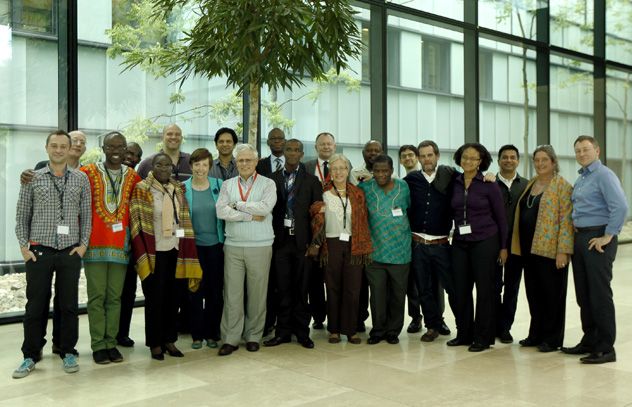
UNAIDS convened an informal policy and strategy consultation in Geneva on 15 and 16 May.
Debrief
UNAIDS consultation on HIV and the human rights of LGBTI people
16 May 2014
16 May 2014 16 May 2014The ability of lesbian, gay, bisexual, transsexual, transgender, and intersex (LGBTI) people to avoid becoming infected with HIV or to live successfully with the virus has recently come under greater threat as a number of countries have increased the criminalization of these already highly stigmatized populations. In order to address this pressing situation and to explore concrete ways forward, UNAIDS convened an informal policy and strategy consultation in Geneva on 15 and 16 May.
Globally, gay and other men who have sex with men are 13 times more likely to be infected with HIV, while transgender people are 19 times more likely to be. Furthermore, results from various monitoring projects are showing that where there has been further criminalization of LGBTI populations, there has also been an increase of fear in the communities, greater concern that health-care workers might report them, growing cases of organized gangs threatening and extorting individuals on the basis of their sexual orientation, and more physical attacks.
The focus of the consultation was to develop strategies to respond to the various health and human rights challenges related to HIV faced by LGBTI people. Shorter-term crisis prevention and management interventions were explored, as well as longer-term sustainable policies and programmes to improve access to health services for LGBTI communities.
Participants
The international gathering brought together implementers, advocates, faith leaders, human rights defenders, donors and representatives of United Nations organizations from countries and regions around the globe, including the Caribbean, India, Kenya, Nigeria, Russian Federation, Switzerland, Uganda, United States of America and Zambia.
Key outcomes
- Participants characterized the social, legal, health and security status of LGBTI people as a global crisis that demands global solutions, while taking into account national, cultural and social opportunities and challenges.
- Participants called on UNAIDS to help counter the widespread myths and misconceptions that drive punitive approaches and stigma.
- Participants also asked UNAIDS to speak out against discrimination in communities and in health services, which acts as a strong disincentive for people to access HIV services.
- There is a need to build wide coalitions, particularly at the country level, among faith-based groups, academia, women’s networks and other human rights defenders working against marginalization and exclusion on the basis of race, ethnicity, religion, etc.
- There is a need to link with, and further support, regional institutions—including the African Commission on Human and Peoples’ Rights and the Inter-American Commission on Human Rights—working on LGBTI health and rights issues.
Quotes
"As a self-identified, openly gay man in India, the recent Supreme Court ruling criminalized my existence. This spells doom for a sustained HIV response amongst the men who have sex with men and transgender populations."
"We are working against a deep and challenging culture of violence and inequity."

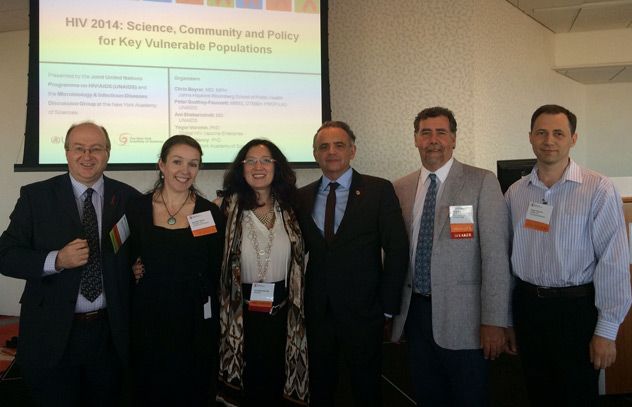
L to R: Peter Godfrey-Faussett, UNAIDS science adviser, Jennifer Henry, The New York Academy of Sciences, Ani Shakarishvili, UNAIDS technical adviser, Luiz Loures UNAIDS Deputy Executive Director, Chris Beyrer, Johns Hopkins Bloomberg School of Public Health, Yegor Voronin, Global HIV Vaccine Enterprise. Credit: UNAIDS

Mark Harrington, Treatment Action Group, Arne Näveke, International AIDS Vaccine Initiative, Ani Shakarishvili, UNAIDS, Mitchell Warren, AIDS Vaccine Advocacy Coalition (AVAC). Credit: UNAIDS
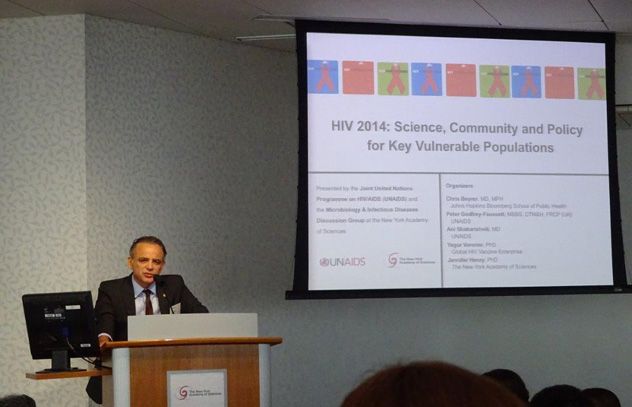
Luiz Loures, UNAIDS Deputy Executive Director and Assistant Secretary-General of the United Nations, delivering the opening remarks at the symposium HIV 2014: Science, Community and Policy for Key Vulnerable Populations.

Chris Beyrer from the Johns Hopkins Bloomberg School of Public Health delivering a keynote address titled New methods, new estimates for men who have sex with men in the World.
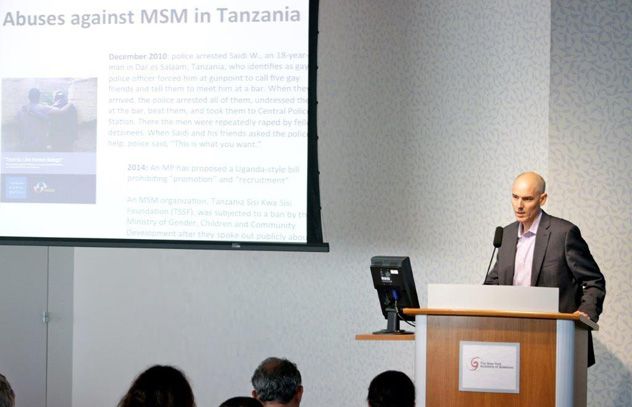
Joe Amon from Human Rights Watch speaking on the political epidemiology of HIV and access to science for key populations.
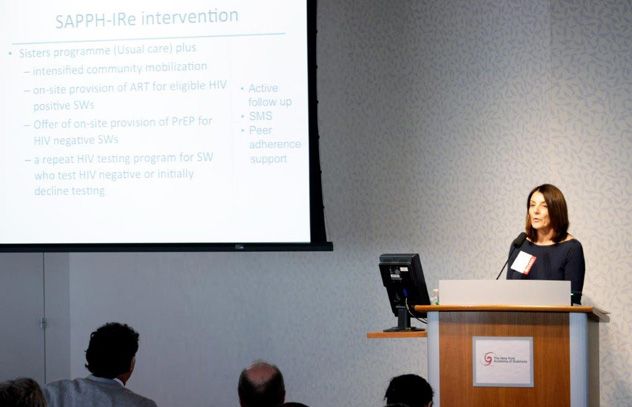
Frances M. Cowan from the Centre for Sexual Health and HIV/AIDS Research describing the SAPPH-IRe Trial – ART for HIV prevention among female sex workers in Zimbabwe.
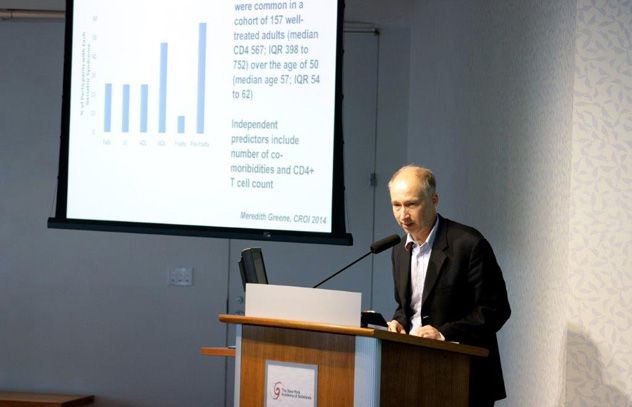
Steven G. Deeks from the University of California, San Francisco (UCSF) speaking on the critical emerging science on HIV and aging in men who have sex with men.
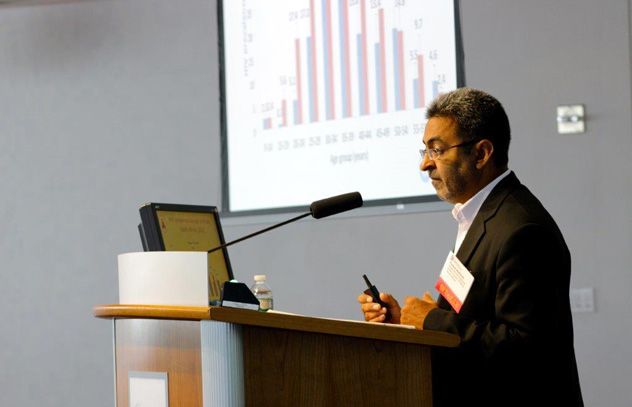
Fareed Abdullah from the South African National AIDS Council describing the scale up of HIV programmes for key populations in South Africa.
Debrief
How to ensure that the benefits of recent scientific advances reach key populations
07 May 2014
07 May 2014 07 May 2014Stigma and discrimination, human rights abuses and challenging legal environments can prevent members of key populations at higher risk—such as men who have sex with men, people who use drugs and sex workers—from realizing the benefits of recent advances in science. UNAIDS and the New York Academy of Sciences therefore held a symposium in New York on 5 May to explore the links between science, community and policy in order to improve access to HIV services for key populations at higher risk.
The participants recognized that key populations have been left behind by the advances made in science over the past few years. The challenge, they said, is to frame the political and structural agenda in such a way that the fruits of scientific discoveries can be shared with the whole of society.
According to the participants, solutions should be based on strong public health arguments and advocate for client-friendly services that improve access to services and not only reduce morbidity and mortality among the direct beneficiaries but also reduce onward transmission. Scientists are taking up the challenge of the special risks that key populations encounter, in terms of both the rapid spread of HIV infection—requiring new HIV prevention technologies—and in terms of comorbidities and the need for integrated HIV services.
Participants
The symposium brought together scientists, policy-makers and HIV service providers, advocates, and activists and community members from around the world.
Common messages discussed
- Community-led approaches offer ways to improve access to integrated services for most key populations.
- Providing access to HIV services to people in the very earliest stages of HIV infection may reduce the long-term consequences of inflammation and immune dysfunction.
- New HIV prevention technologies, such as pre-exposure prophylaxis, which may soon become available as a three-monthly injection, could provide an important addition to the HIV prevention package for men who have sex with men and for women at higher risk of HIV exposure, such as sex workers in high-prevalence countries.
- Coinfections and comorbidities are particularly relevant to many key populations and hence the advances in treatment for hepatitis C and approaches to manage tuberculosis in prisons, or sexual and reproductive health services for sex workers along trucking routes, are major steps forward.
Quotes
"With the knowledge we have today we could have the means to end the AIDS epidemic. But we will not achieve this if we leave people behind. Access to science for key populations and greater development of implementation science are key to the future of the AIDS response."
"We most urgently need to move forward with implementing those evidence-based programmes we know to be effective, and to do so without discrimination for those who need them most."

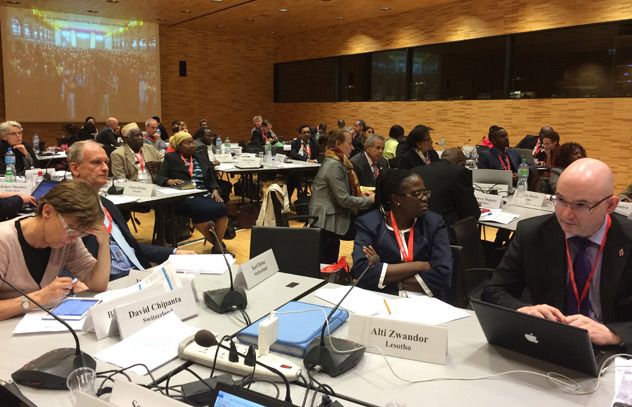
Meeting participants. Credit: UNAIDS
Debrief
What will it take to virtually eliminate sexual transmission of HIV by 2030?
11 April 2014
11 April 2014 11 April 2014Despite the significant decline in new HIV infections over the last decade, there is a need for a new phase of HIV prevention, with greater focus, innovation and accelerated and sustained action towards globally agreed targets. To re-energize global commitment to HIV prevention and make recommendations for action UNAIDS convened a global HIV prevention meeting in Geneva, Switzerland from 10-11 April 2014.
Participants
The meeting brought together National AIDS Council managers from 14 of the countries most affected by HIV, UN system staff, selected civil society representatives, key partners and experts.
Key messages
- In 2012, about 2 million new adult infections occurred, most of them in key populations and in young people, especially young women in Africa.
- The tools exist to significantly reduce new infections in the coming years, and virtually eliminate sexual transmission by 2030.
- For national prevention efforts to be optimised, they need to effectively operationalise combination prevention, re-invigorate strategies which work like condom promotion and services for key populations, and adopt and integrate innovations such as Pre-Exposure Prophylaxis (PrEP), cash transfers and new devices for male circumcision.
- New media tools need to be leveraged for mass awareness.
- New forms of community mobilization need to be explored
- Countries and partners need to review their strategies, define prevention targets beyond 2015 and allocate the resources to achieve them.
Quotes
"Women and girls are the most affected--to reach them and prevent new infections we need combine different biomedical, behavioral and structural approaches including economic and gender empowerment programmes."
"Involve young people in prevention- come and enter our world. We do not want to be passive recipients of interventions."
"We need a more useful understanding of sex, in addition to moral, legal, partisan, religious and ideological prescriptions to reduce new HIV infections."
"We successfully curbed the epidemic in Zimbabwe in the early days—we welcome this meeting because we know that challenges and opportunities are different today."
"Community structures, civil liberties and service access might not be enough to curb the epidemic among men who have sex with men but they are a requirement for preventing new HIV infections. We also need new tools like Prep and treatment."

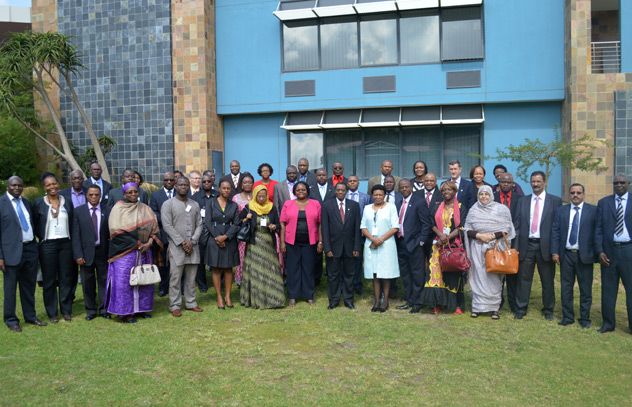
Participants of the Pan-African Parliament roundtable.
Debrief
African Parliamentarians call ending AIDS to be priority in the post-2015 agenda
27 March 2014
27 March 2014 27 March 2014The special role of parliamentarians in advancing the AIDS response now and beyond 2015 was discussed on 25-26 March during a roundtable at the Pan-African Parliament in Midrand, South Africa.
The meeting was organized by the African Union Commission (AUC) in collaboration with the NEPAD Agency, and in partnership with the Pan-African Parliament (PAP) with support from UNAIDS and Global Fund.
The aim of the dialogue was to create awareness and build the capacity of parliamentarians on the agreed 2013 Abuja actions toward the elimination of AIDS, TB & Malaria in Africa by 2030, the Roadmap on shared responsibility and global solidarity for HIV/AIDS, TB and Malaria, and the AU Manufacturing Plan for Africa (PMPA) including the African medicine regulatory harmonization (AMRH) initiative.
Participants recognized the comparative advantage that Members of Parliament have to follow through the implementation of policies and legislative frameworks.
Participants:
Members of Parliament from the continent representing national, regional and the Pan-African parliaments; representatives from the African Union Commission, NEPAD Agency, the African Peer Review Mechanism, the Global Fund to fight AIDS, Tuberculosis and Malaria, UNIDO, Pharmaceutical Manufacturers Association and the Africa Civil Society Platform.
Key Outcomes:
Parliamentarians committed to:
- Advocate for and engage with national stakeholders to ensure that ending AIDS, TB and Malaria epidemics remains a key priority in the national, continental and global agenda beyond 2015.
- Gather data on access to health services by vulnerable and key populations as well as to review laws and policies that affect access to services.
- Support the initiative to achieve universal access to HIV treatment on the continent, including HIV treatment for children, as an important catalyst for saving lives, preventing new HIV infections and moving towards ending the AIDS, TB and Malaria epidemics.
Quotes
“We, Pan-African Parliamentarians, commit to give priority to AIDS, TB and Malaria in the post-2015 development agenda, and improving human rights protection and promotion of people living with HIV and key populations.”
“We rely on you, Honourable Members, to use your parliamentary platforms at the national, regional and continental levels for advocacy, oversight and accountability on issues on the health agenda.”
“We are coming up with great recommendations but more important is the need to translate these into action and implementation to improve the welfare of our constituents.”
“UNAIDS is committed to supporting parliamentarians with the relevant strategic information on the AIDS epidemic as well as other tools to assist parliamentarians make decisions and provide oversight for the AIDS response.”

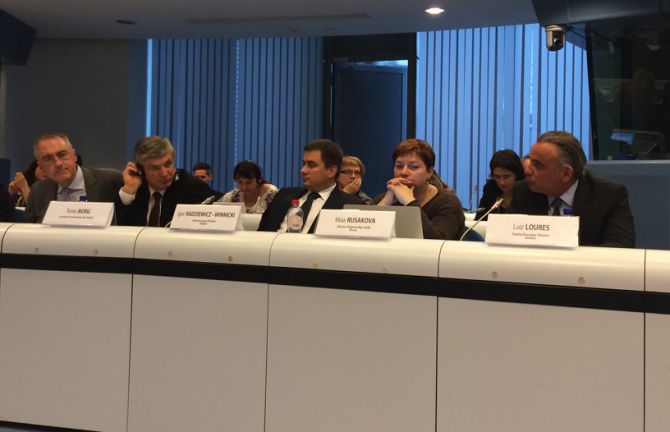
UNAIDS Deputy Executive Director Luiz Loures (second from right) with Tonio Borg, EU Commissioner for Health (second from left); Igor Radziewicz-Winnicki, Undersecretary of State for Poland (centre); Maia Rusakova, Director, Regional NGO Stellit, Russia; and John F. Ryan Acting Director, Public Health Directorate, Directorate General for Health and consumers, European Commission (far left).
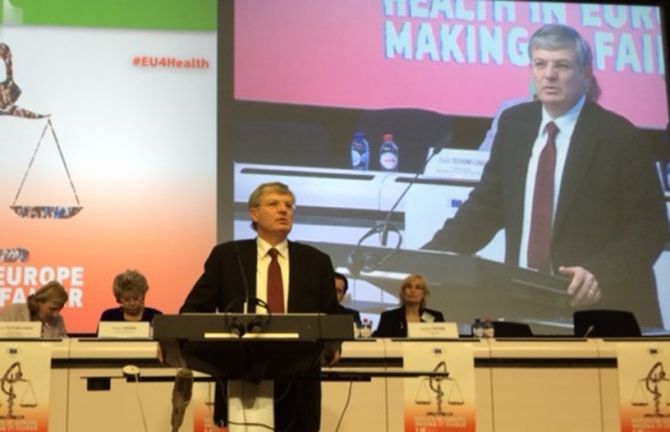
Tonio Borg, EU Commissioner for Health.
Debrief
EU Commission for Health reiterates commitment to HIV
20 March 2014
20 March 2014 20 March 2014The European Commissioner for Health, Tonio Borg announced on 18 March to take forward the action plan on HIV in the EU and neighbouring countries for 2014-2016—a strong indication of the continuing commitment of the EU to address the AIDS epidemic as a priority.
The action plan on HIV will allow future work to focus on a unified approach to the elimination of discrimination, enhancing political leadership of the EU in this area and improving access to HIV services in particular for vulnerable groups.
The announcement was made at a conference held by the European Commission in Brussels to identify the causes of the growing inequities in accessing healthcare in the European Union. The conference—which focused on three key areas including equity, HIV, and the health of people in vulnerable situations—aimed to define the basic principles and values for improved equity and reduced discrimination when accessing health services.
Successful strategies in addressing the health needs of people in vulnerable situations were shared and the perspectives of a wide range of groups with particular needs put forward including people from ethnic minorities, irregular migrants, older people and Roma people.
HIV prevalence in Europe is increasing in key populations at higher risk, especially among men who have sex with men. In Eastern Europe the epidemic is also growing among people who inject drugs, their sexual partners and among sex workers.
Participants
Opened by Viviane Redding, Vice-President of the European Commission and by European Commissioner for Health, Tonio Borg, the conference was attended by high-level participants from government including the Ministers of Health of Greece, Latvia and Undersecretary for Health of Poland and civil society organisations in the European Union. UNAIDS Deputy Executive Director, Luiz Loures also participated in the event.
Key issues
- Discrimination against specific groups and populations in the European Union including gay, lesbian, bisexual or transgender people and migrant populations is blocking access to HIV prevention and treatment services as well as early testing and timely diagnosis of HIV.
- Discrimination also affects public health policies for other chronic diseases.
- An EU wide strategy remains a priority as this is a transnational issue
- The empowerment and engagement of key populations as political voices and partners at all levels remain essential and should be reinforced and anchored within a broader strategy.
- Further review of progress and identification of next steps in the EU is needed in the lead up to the Dublin+10 Conference—which will mark the 10th anniversary of the Dublin Declaration on Partnership to Fight HIV/AIDS in Europe and Central Asia.
Quotes
“Discrimination is not a rhetorical issue—it costs money and lives and needs to be addressed through our united contribution as a mainstream issue.”
“Diseases don't know borders and this is why an EU strategy is essential.”
“We stand united in our determination to improve fairness in health.”
Related

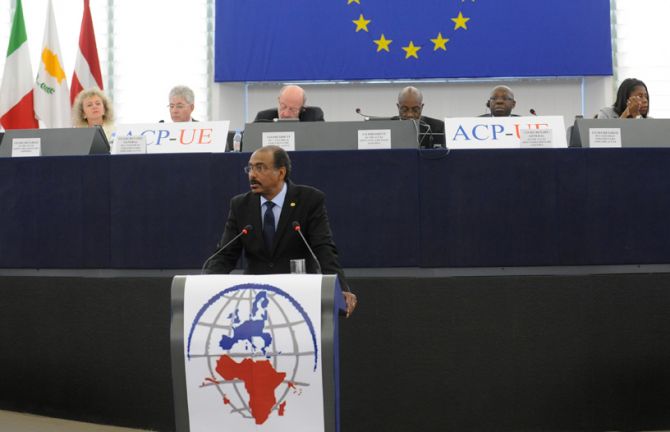
The importance of prioritizing AIDS in the post-2015 development agenda was discussed during a key note debate at the Joint Parliamentary Assembly of the African, Caribbean and Pacific States and the European Union in Strasbourg, France on 18 March. The debate was introduced by UNAIDS Executive Director, Michel Sidibé.
Debrief
Parliamentarians call for AIDS as priority in the post-2015 agenda
18 March 2014
18 March 2014 18 March 2014The importance of prioritizing AIDS in the post-2015 development agenda was discussed during a key note debate at the Joint Parliamentary Assembly of the African, Caribbean and Pacific States and the European Union in Strasbourg, France on 18 March. The debate was introduced by UNAIDS Executive Director, Michel Sidibé.
Participants
Members of parliaments from 79 African, Caribbean and Pacific states, members of the European Parliament, UNAIDS Executive Director Michel Sidibé.
Key messages
- The response to HIV has been a key transformative pathfinder for broader progress on health and social justice.
- Stagnation or reversal of results in the AIDS response will have grave implications for millions of people living with HIV around the world.
- Continued shared responsibility and global solidarity through domestic spending and international financing needed to sustain and accelerate progress on AIDS.
- Further dialogue needed to reach consensus regarding the existence of punitive laws which prevent men who have sex with men from accessing health and treatment services.
The goal of ending AIDS must have a prominent position in the post-2015 agenda, as a leading force for health and social justice, which will leave no-one behind.
Quotes
"I am deeply concerned with the new wave of punitive laws that undermine human rights, increase vulnerability to HIV and hamper effective HIV responses for populations most at risk, and call for their removal. The concept of cultural specificity cannot, in any case, justify the infringement of international law of human rights and universal values that define and guarantee absolute protection of privacy and the most intimate choices."
"The AIDS response has been one of the most successful and innovative social movements in history. But we need to continue our fight against AIDS and for human rights. I am certain we can achieve this together—and ensure that nobody is left behind!"
"We have overcome indifference and scepticism. But in the response to HIV, we still face two major challenges: financial dependency and the continued exclusion and discrimination of the most vulnerable people in societies."






